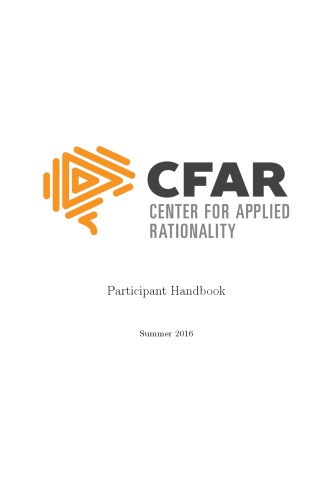Product desciption
Cfar Participant Handbook Summer 2016 Center For Applied Rationality by Center For Applied Rationality instant download after payment.
This is your content handbook. It’s meant as a reference material, so that you can examine the theoretical underpinnings of our techniques, refresh yourself on particular steps or methods, and go beyond what’s taught at the workshop. Each class has its own section, including
* Epistemic status — This is a measure of our *confidence* in any given model or technique, including whether it was developed from cognitive science research, through practical iteration, or a mix of both. We currently use five confidence categories:
- Preliminary/tentative. These are our most hypothetical courses, comprising newly generated theories, experimental pedagogy, and untested or anecdotal conjectures. While we wouldn’t include them if they weren’t promising, they are likely to change as we evaluate and iterate.
- Mixed. Like the courses in the preliminary/tentative category, these include some elements that lack strong research-based underpinnings, but they also rely heavily on established literature. In general, we try to highlight which parts are more speculative.
- Anecdotally strong. This category overlaps with mixed in terms of confidence level. Courses that are labeled anecdotally strong generally have little or no formal research behind them, but have been refined through iteration and feedback from participants.
- Firm. These are courses that are directly derived from or supported by research, and are generally straightforward applications of well-known concepts in cognitive psychology, sociology, economics, game theory, or decision theory.
* Theory and context — None of our models or techniques were developed in a vacuum; each emerged in response to a common bias, situation, or problem, and is best used in some specific aspect of thinking, planning, or execution. For each one, we describe the contexts in which it’s likely to be useful, as well as the observations or theories-of-mind which informed its development.
* Step-by-step breakdown — The most basic how-to for each technique, with specific steps in specific order. Usually, this is not the best or “final form” of a given piece of the art of rationality—instead, this is your known-good jumping-off point as you tinker and try your own experiments.
* Resources for further exploration — We’ve pulled together a wide range of books, articles, and online sources for you to deepen your understanding of the core theory behind our curriculum, or explore further beyond the basic techniques.
While you may be tempted to read ahead, be forewarned—we’ve often found that participants have a harder time grasping a given technique if they’ve already anchored themselves on an incomplete understanding. Many of the explanations here are intentionally approximate or incomplete, because we believe this content is best transmitted in person. It helps to think of this handbook as a *companion* to the workshop, rather than as a standalone resource.


